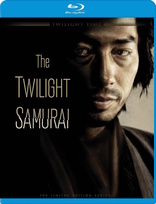The Twilight Samurai Blu-ray Movie
HomeThe Twilight Samurai Blu-ray Movie 
Tasogare Seibei | Limited Edition to 3000 - SOLD OUTTwilight Time | 2002 | 129 min | Not rated | Nov 11, 2014
Movie rating
8 | / 10 |
Blu-ray rating
| Users | 0.0 | |
| Reviewer | 3.0 | |
| Overall | 3.0 |
Overview
The Twilight Samurai (2002)
Set in the late nineteenth century, Seibei Iguchi is a low-ranking samurai whose wife has died of tuberculosis. With two daughters, Kayano and Ito, and an elderly mother to support, he and his family must survive in austerity. The moment that his daily work as a clerk, in one of the clans' warehouses is over, he hurries home, refusing to drink or eat with fellow samurai. Behind his back, his fellow samurai teasing him for his actions. The divorce of his childhood friend Tomoe leads him into a confrontation with her violent ex-husband, a high-ranking samurai. When word of Seibei's easy victory using only a wooden sword begins to circulate, his reputation for sword-fighting prowess begins to change his colleagues assessment of him.
Starring: Hiroyuki Sanada, Rie Miyazawa, Min Tanaka, Nenji Kobayashi, Ren ŌsugiDirector: Yōji Yamada (I)
| Foreign | Uncertain |
| Drama | Uncertain |
| Romance | Uncertain |
Specifications
Video
Video codec: MPEG-4 AVC
Video resolution: 1080p
Aspect ratio: 1.85:1
Original aspect ratio: 1.85:1
Audio
Japanese: DTS-HD Master Audio 5.1
Music: DTS-HD Master Audio 5.1
Subtitles
English
Discs
50GB Blu-ray Disc
Single disc (1 BD)
Playback
Region free
Review
Rating summary
| Movie | 4.0 | |
| Video | 2.5 | |
| Audio | 4.0 | |
| Extras | 1.5 | |
| Overall | 3.0 |
The Twilight Samurai Blu-ray Movie Review
Reviewed by Jeffrey Kauffman December 4, 2014The fact that this Academy Award nominated 2002 film has the word Twilight in its title might end up recommending it to a demographic that might not otherwise cotton to a tale of a shift in culture and economy that threatens a former warrior class. In that regard, cinephiles would probably find a more suitable analog in The Last Samurai, though The Twilight Samurai is decidedly less epic than the 2003 Tom Cruise film, prefering instead to concentrate on more intimate details in the life of Seibei Iguchi (Hiroyuki Sanada), a 19th century samurai who finds himself caught in a world that no longer really requires samurai clans, something that’s doubly ironic in that Iguchi’s own samurai clan doesn’t especially require him. The Twilight Samurai is a quiet, even slightly plodding, film that is much more of a character study than a traditional samurai action film. For those wanting to bask in some serious period ambience, though, the film offers a wealth of dramatic interest.
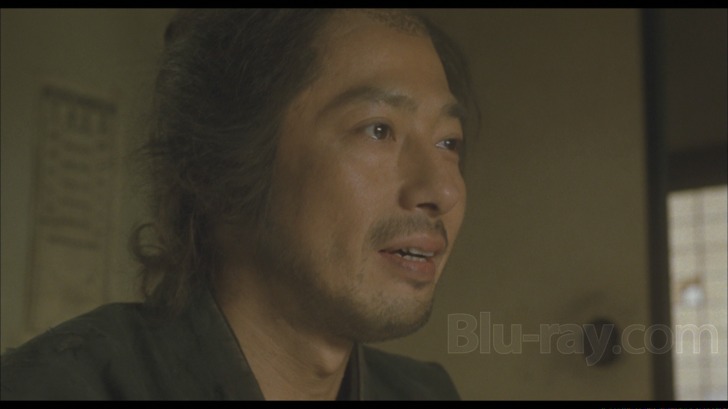
It’s not just societal changes that are afflicting Iguchi, for the character is beset by a number of personal woes that seem to add insult to injury. As the film opens, Iguchi is a new widower, suddenly thrust into the role of sole caregiver to his young daughters, as well as his elderly mother who is suffering from dementia. Iguchi might find some respite in his career, but alas, that side of things is not going much better. Iguchi works as a menial stockboy of sorts at his clan’s grainery, where his unkempt appearance and dutiful attention to his daughters and mother invite outright disdain from his samurai cohorts.
Co-writer and director Yōji Yamada carefully details the kind of sadsack life of Iguchi before offering the first real glimmer of hope, when an erstwhile romantic interest of Iguchi’s, a young woman named Tomoe (Rie Miyazawa) returns to his village in the hopes of escaping an abusive husband. Tomoe takes an immediate interest in both Iguchi and Iguchi’s daughters, and there seems to be at least a chance at a happy ending, though it’s notable that Tomoe’s background is as troubled as Iguchi’s in its own way. When Tomoe’s blowhard husband shows up demanding access to his wife, Iguchi is forced into action, in the first of this film’s rather brief and small scale fight scenes.
What’s fascinating about The Twilight Samurai is how it deals openly with the quasi-caste system that was prevalent in Japan as late as the 19th century, something that defines Iguchi in ways that keep him—perhaps due to his own preconceptions of his station in life—from actively pursuing that happily ever after with Tomoe. Also interesting is the fact that while Iguchi is shown to be a rather skilled swordsman (something that comes into play especially in a later development with a competing samurai), he actually simply wants a life of quiet contemplation, something that ironically will keep him from climbing up whatever small socioeconomic ladder Japan has to offer.
The Twilight Samurai will pay substantial dividends for those with a little patience who can allow the film to unfold in its rather leisurely though never lethargic pace. Performances are absolutely first rate, with Sanada achieving a rare combination of resolve and almost inscrutable resignation to the vagaries of fate. Yamada directs in an unshowy but firm manner, keeping things quietly intense in what might be thought of as a cinematic equivalent to a true samurai manner. The Twilight Samurai didn’t win the American Academy Award for Best Foreign Language Film, but it swept that year’s Japanese Academy Awards, winning all the major prizes, including Best Picture, Actor, Actress, Supporting Actor, Director and Screenplay.
The Twilight Samurai Blu-ray Movie, Video Quality 
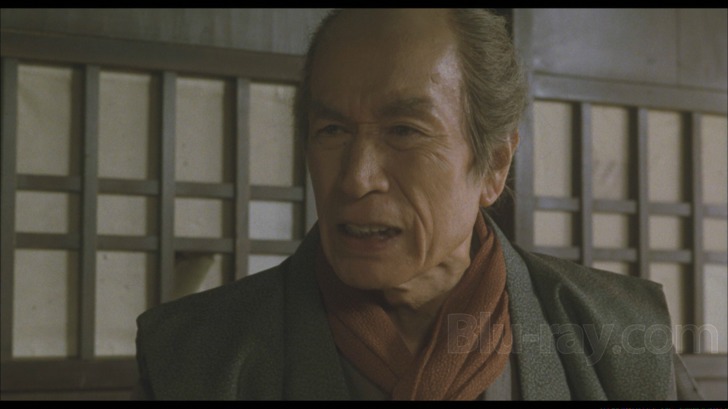
The Twilight Samurai is presented on Blu-ray with an AVC encoded 1080p transfer in 1.85:1. This is a rare misfire from Twilight Time,
one
that seems to have been afflicted by the difference (or misunderstanding of what once was a difference) in dealing with luma scale, where
things can be graded from 0-255 or alternatively 16-235. Perhaps the easiest comparison is between televisions, which utilize 16-235,
and PCs, which utilize 0-255, to "define" the spectrum from black to white. What that means in terms of the video quality here is that this is
an overly brightened, low contrast
offering where blacks are a
middling gray at best (something that's instantly clear with the first screen featuring Japanese ideographs, which should be against a
pure black background, but which are here set against what amounts to an almost light gray). Interior scenes can look really murky,
often with a misty
yellow
ambience. Color grading also seems off, with the entire film tipping toward yellow, though that said, more brightly lit exterior scenes look at
least
relatively more natural (see screenshots 7 through 9, and 13), though even here there isn't a lot of depth to the image. That said, it's obvious
that Yamada and cinematographer Mutsuo Naganuma aren't really interested in traditional visual "pop," preferring instead to cast the film in
rather muted, restrained tones. The entire transfer is decidedly soft looking, and since many of the close-ups
take
place in dimly lit interior environments, detail never really rises much above average levels at best, though again it tends to be somewhat
better in more brightly lit
scenes. Grain is fairly heavy throughout the presentation, occasionally
clumping unnaturally, but there are
also minor compression artifacts on display in some darker moments.
Note: As has been discussed in our forum, members who are able
to
set their RGB to "full" (i.e., 0-255) on their Blu-ray players (including the PS3) may see
an incremental improvement in the image quality, but it's frankly not a dramatic change. For those interested in some of the technical aspects
of our
screenshots, we always take screenshots with RGB set to full. Therefore, these screenshots represent the best image quality obtainable from
this release.
The Twilight Samurai Blu-ray Movie, Audio Quality 
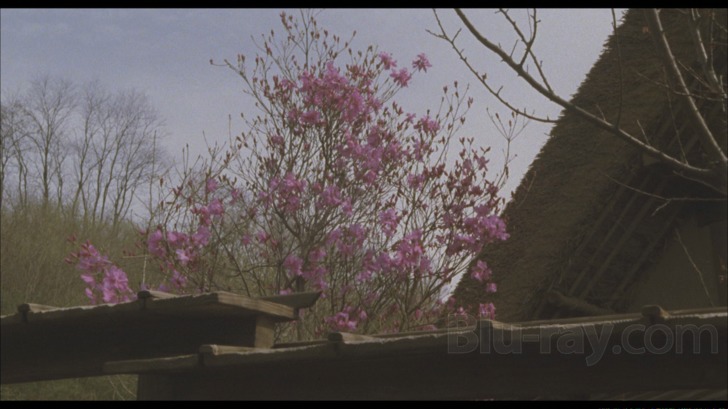
The Twilight Samurai features a nicely nuanced DTS-HD Master Audio 5.1 mix that creates significant if subtle immersion out of a glut of ambient environmental effects as well as Isao Tomita's interesting score. (Tomita, who won the Japanese Academy Award for this score, may be best remembered for his groundbreaking synthesizer albums from the 1970s, including his inimitable recreations of Debussy, Snowflakes are Dancing.) Dialogue is very cleanly presented, and while the track doesn't have huge dynamic range, things are quite vibrant and lifelike, with no issues of any kind to report.
The Twilight Samurai Blu-ray Movie, Special Features and Extras 
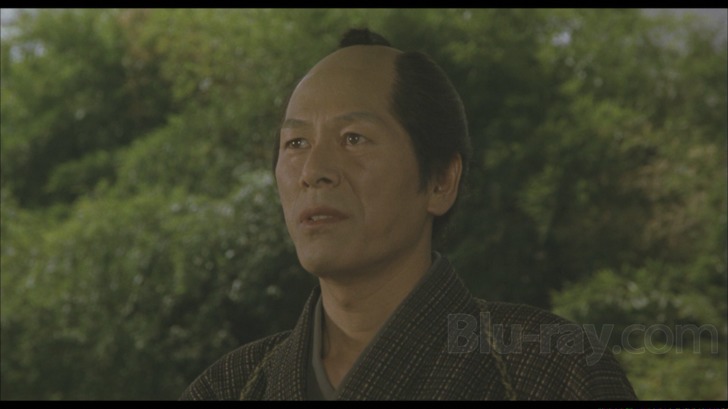
- Isolated Score Track is presented in DTS-HD Master Audio 5.1.
- Original Theatrical Trailer (480i; 2:08)
- The Little House Trailer (1080i; 1:02). Compare the blacks, contrast and color on this trailer to the main feature for an instructive lesson.
The Twilight Samurai Blu-ray Movie, Overall Score and Recommendation 
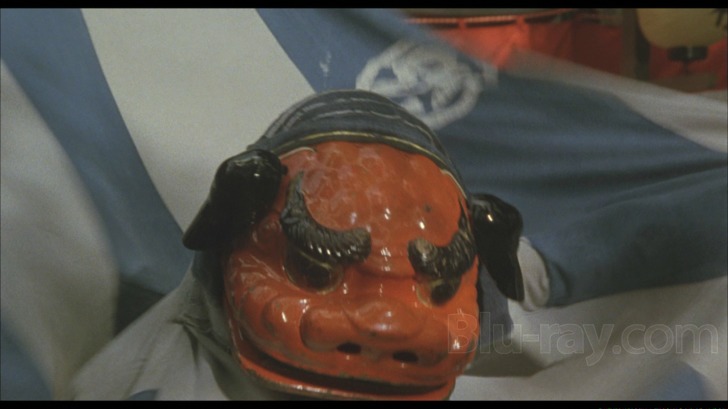
The Twilight Samurai is an incredibly compelling, even moving, experience, one that is slow but steady in detailing various hardships (including some self inflicted ones) encountered by Iguchi as he attempts to find his place in a rapidly changing world. This is intimate filmmaking at its most profound, with a sure sense of place and time and some remarkably lived in performances. Unfortunately, the problematic video quality may be a deal killer for many collectors, which is especially sad given this film's overall quality.
Similar titles
Similar titles you might also like

The Hidden Blade
Kakushi ken oni no tsume
2004

Le Combat dans l'īle
Fire and Ice | Limited Edition
1962

Akira Kurosawa's Dreams 4K
夢 / Yume
1990

El Sur
1983

Children of Paradise
Les enfants du paradis
1945

Mishima: A Life in Four Chapters 4K
Director's Cut
1985

Mustang
2015

Les Enfants Terribles
1950

An Actor's Revenge
雪之丞変化 / Yukinojō henge
1963

Ponette
1996

Dodes'ka-den
どですかでん / Dodesukaden
1970

Naked Childhood
L'enfance nue
1968

Crķa Cuervos
1976

I Live in Fear
Ikimono no kiroku
1955

Julieta
2016

Omar
2013

Pain and Glory
Dolor y gloria
2019

Like Father, Like Son
2013

Capernaum
Capharnaüm
2018

The New Girlfriend
Une nouvelle amie
2014
